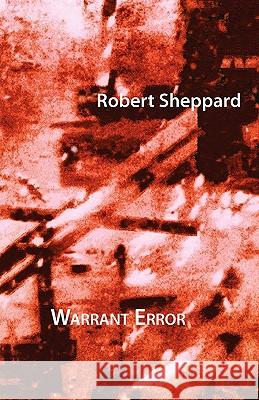Warrant Error » książka
Warrant Error
ISBN-13: 9781848610187 / Angielski / Miękka / 2009 / 124 str.
Warrant Error is not just a book about the war on terror, yet neither does it seek to evade it, but to exceed it. Each sonnet in the four sets of 24 (plus 4 other poems, making a hundred) evokes a little world, as a sonnet ought, and questions it. The poems play with the expectations we have of the form, as much as they use the sonnet sequence's traditional power to switch viewpoint or attention poem by poem. Some of these look hard at the rhetoric of the war on terror and the one of terror, and, via pun, ferocious word-play and reversal, effect an interrogative unpacking more urgent even than in Sheppard's Twentieth Century Blues. Some poems focus upon single times and places-the field of vision as well as the field of battle-with an imagistic precision that suggests that perception is the birth of clear thinking. Others offer counter-music to the global in the local, by focussing on the domestic world of fluid selves, small objects and minor incidents, with a tender and personal tone new to Sheppard's work. Against this, possible worlds and fantastic scenarios are offered to ask, in a speculative but often humorous way, how we got the way we are. As an ambitious whole, Warrant Error wonders whether compassion is still one of the passions and tests the strengths of what the poems call the human covenant against human unfinish, an ethical and aesthetic ideal that aims to suggest that all these stories-real, fantastic, or both-are only our stories so far. To be continued. This is not so much about finding beliefs to endure (into) this dangerous century, but about presenting as poems a shifting ground upon which they will find themselves at war or peace.
Warrant Error is not just a book about the war on terror, yet neither does it seek to evade it, but to exceed it. Each sonnet in the four sets of 24 (plus 4 other poems, making a hundred) evokes a little world, as a sonnet ought, and questions it. The poems play with the expectations we have of the form, as much as they use the sonnet sequences traditional power to switch viewpoint or attention poem by poem. Some of these look hard at the rhetoric of the war on terror and the one of terror, and, via pun, ferocious word-play and reversal, effect an interrogative unpacking more urgent even than in Sheppards Twentieth Century Blues. Some poems focus upon single times and places-the field of vision as well as the field of battle-with an imagistic precision that suggests that perception is the birth of clear thinking. Others offer counter-music to the global in the local, by focussing on the domestic world of fluid selves, small objects and minor incidents, with a tender and personal tone new to Sheppards work. Against this, possible worlds and fantastic scenarios are offered to ask, in a speculative but often humorous way, how we got the way we are. As an ambitious whole, Warrant Error wonders whether compassion is still one of the passions and tests the strengths of what the poems call the human covenant against human unfinish, an ethical and aesthetic ideal that aims to suggest that all these stories-real, fantastic, or both-are only our stories so far. To be continued. This is not so much about finding beliefs to endure (into) this dangerous century, but about presenting as poems a shifting ground upon which they will find themselves at war or peace.











